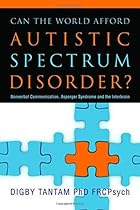Can the World Afford Autistic Spectrum Disorder?: Nonverbal Communication, Asperger Syndrome and the Interbrain

| Author | : | |
| Rating | : | 4.15 (545 Votes) |
| Asin | : | 1843106949 |
| Format Type | : | paperback |
| Number of Pages | : | 256 Pages |
| Publish Date | : | 2016-04-12 |
| Language | : | English |
DESCRIPTION:
Digby Tantam's expertise blighted my life Wendych Digby Tantam has not always been an expert in autistic spectrum disorder. He was once an expert on post natal depression, and the treatment I received whilst in his care has blighted my life. Admittedly, I was ill when I was first admitted to Withington Hospital Mother and Baby Unit, but when I recovered and noticed that my baby will ill, he treated my concerns as delusions - prescribing powerful anti-psychotic drugs and 21. "A Book You Cannot Afford to Pass Up" according to Mary Lou Cheatham, Author, The Dream Bucket. Can the World Afford Autistic Spectrum Disorder?: Nonverbal Communication, Asperger Syndrome and the Interbrain by Digby Tantam, Ph.D., is a penetrating look by a practicing scientist at the known science and personal observations of the operation and struggles of those afflicted with this type of brain structure.Tantam describes the behavioral and social functioning of the person with Autistic Spectrum Disorder (ASD) with . Amazon Customer said Communication Falling Short. This book is an exploration of the mental systems that are affected by autism spectrum disorders. Tantum is a recognized expert on the subject, and he founded an Asperger's syndrome clinic in the United Kingdom. In this book, he examines the hypothesis that the problems that people with autism spectrum disorders have relate to a specific deficit in non-verbal communication. Making an analogy to the Internet, he proposes tha
This vastly neglected area of research is also likely the single greatest challenge for individuals with autism. Tantam's book takes us through a fascinating tour of a world where social experience is essentially the co-creation of people engaged in fast, broad, and essentially nonverbal inter-actionA". Words are slow, linear, and often obfuscate rather than illuminate others' intentions. Thus in one stroke Dr. 'Dr. Tantam both compels us to uphold social intuition for investigation, and helps us to appreciate what social contact is in the absence of this invisible glue.' --Ami Klin, Ph.D., Director of Autism Program, Harris Professor of Child Psychology and Psychiatry Yale Child Study Center
It helps us understand whether our beliefs do or do not have social approval, and it generally guides us in our relations with others. Digby Tantam argues in this book that the world affords us a web of subliminal non-verbal communication that regulates our brains. He shows how knowledge of this difference can be used to overcome some of the impairments in nonverbal communication in people with ASD, but also how acknowledging these problems can result in more positive development elsewhere. People with autism do not seem to be influenced by these subliminal signals and this results in the difficulties in social interaction that are so characteristic of all the autistic spectrum disorders. He provides abundant evidence for it being impaired in people with autism spectrum disorder (ASD). How is such nonverbal
He founded an Asperger Syndrome clinic in 1980, and has written numerous articles and books on autism spectrum disorders. Digby Tantam is Clinical Professor of Psychotherapy at the University of Sheffield, and Honorary Consultant Psychiatrist and Psychotherapist for Sheffield Care Trust.
